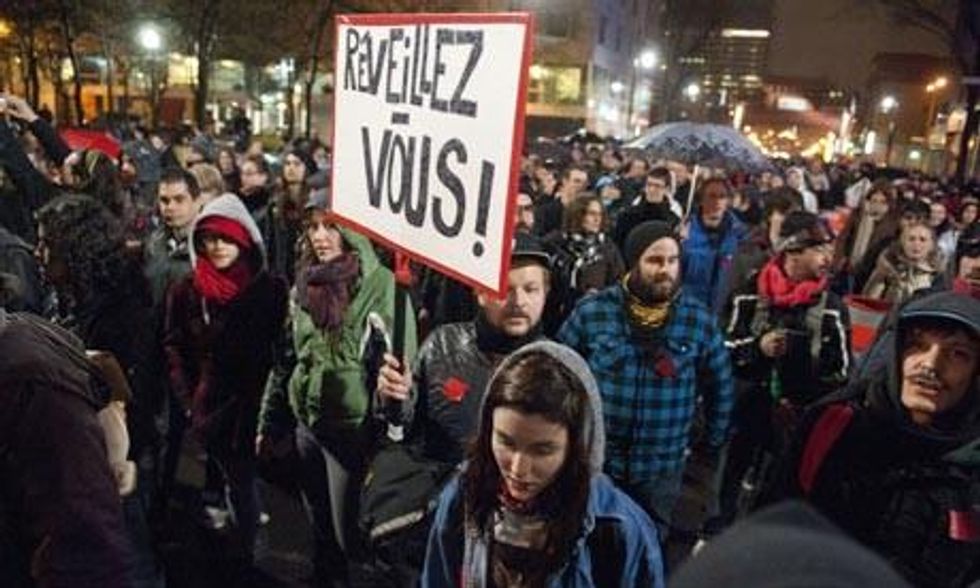The social unrest roiling Quebec is colour-coded red. One cannot miss the hundreds of thousands of people with cloth of the colour pinned to their coats and satchels; the stickers pasted on street poles and storefront mannequins; and the sheets fluttering from balconies and windows. The red squares - punning visually on a French expression to be squarely in the red, or in debt - are a gesture of solidarity with university and college students on a massive general strike against government tuition fee hikes.
They have also become a symbol of the most powerful challenge to neoliberalism on the continent.
Canadian students have been furiously mobilizing for a freeze on tuition fees since last spring, when the Liberal provincial government announced hikes of 75% over five years. A general strike launched this February shuttered most of the province's colleges and universities.
In Montreal, family-friendly street-theatre and marches peaked with a historic rally of 200,000 on 22 March; business-unfriendly blockades of banks, bridges and government ministries have often paralyzed the downtown core. And over the last week, tens of thousands have joined a nightly protest ritual, marching through Montreal past the midnight hour.
Tuition in Quebec remains the lowest in North America, because of generations of student protest - but the militant coalition CLASSE, representing half the striking students, has always included in its program free and universal post-secondary education.
The government's response has been to wage a war on the students' right to collectively negotiate the conditions of their studies. It has mocked and vilified students in the corporate media; sought legal injunctions to dismantle picket lines and force teachers to class; and unleashed vicious police crackdowns and mass arrests against peaceful protesters as young as 15 and 16. Some students now wear red eye-patches after one was shot at close range by a flash-bang grenade and lost his vision.
In the painful tumult of daily protests, an entire generation of Quebecois youth is learning a political lesson no class would ever teach: violence underlies all of society's inequalities, and power doesn't yield an inch without a fight.
The students' courage and creativity in the face of such brutality has lit a fire under Quebec. Their achievement has been to begin to clarify for a broad swath of society that a tuition hike is not a matter of isolated accounting, but the goal of a neoliberal austerity agenda the world over. Forcing students to pay more for education is part of a transfer of wealth from the poor and middle-class to the rich - as with privatization and the state's withdrawal from service-provision, tax breaks for corporations and deep cuts to social programs.
The fault-lines of the struggle over education - dividing those who preach it must be a commodity purchased by "consumers" for self-advancement, and those who would protect it as a right funded by the state for the collective good - has thus sparked a fundamental debate about the entire society's future.
Quebec is, in some ways, uniquely disposed for such a debate. During the long struggle to maintain a French identity under pressure of English Canadian domination and the homogenizing force of the market, Quebecois have developed a strong sense of social solidarity. While neoliberalism has captured the two main political parties and incrementally encroached on the economy, its cultural victory - instilling values of rampant individualism and competition - has only been partial.
The ideal of free post secondary education - recommended in the 1960s by a famous state-commissioned inquiry, but long since snuffed out among the economic elite - has been kept alive for decades by the student unions. And as the federal Conservative government, increasingly indifferent to Quebec, shifts economic and political power westward to Alberta, such progressive yearnings could deepen.
Little wonder students' imagination was stirred by the past year of world rebellion. That inspiration has been distilled in the movement's main slogan, "Printemps erable," a clever play on words that literally means Maple Spring but sounds like Arab Spring.
The Occupy movement has also been a game-changer, here as elsewhere. Its spirit of direct democracy has clicked with the Quebec student union's history of grassroots organizing through decentralized general assemblies. And it has given students a fresh language with which to understand the 1%'s attempt to pass the buck to students: the emerging consensus of the neoliberal elite - whether in Quebec, Chile, England or the US - is that they would prefer their labor force pay for its own education and training, and then simply exploit them.
If students have brought the spirit of global unrest to Quebec, what the government fears most is that they may now spread it permanently to wider society. Students are deepening ties with laid-off and locked-out workers across the province. They have joined civic groups in criticizing a multibillion-dollar scheme to open up indigenous peoples' lands in Quebec's north to a frenzy of mining, oil and forestry operations, which the premier has shopped to investors in London, Tokyo and Rio De Janeiro. And the movement gave an electrifying jolt to an Earth Day mobilization on 22 April, helping to bring nearly 300,000 onto the streets. It is hardly a coincidence that, the same day, the Quebec government agreed finally to negotiations.
The government has delayed in the hope that the student movement will sputter out, succumb to division, or marginalize itself through street-fighting and property damage. They have badly miscalculated. Cracks are indeed appearing, but among the ruling Liberal party and their business allies. Policing costs will soon exceed the value of the tuition increase. Montreal's tourist reputation could take a hit. And students are beginning to garner international press and support.
The feeling taking root among students and others is that this is the chance to turn the tide of a generation. In the words of the French chant resounding daily in the streets, "On ne lache pas" - we're not backing down.




